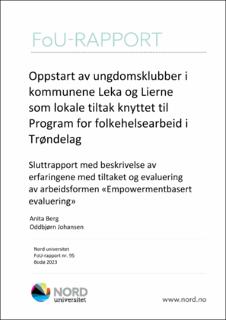Oppstart av ungdomsklubber i kommunene Leka og Lierne som lokale tiltak knyttet til Program for folkehelsearbeid i Trøndelag : Sluttrapport med beskrivelse av erfaringene med tiltaket og evaluering av arbeidsformen «Empowermentbasert evaluering»
Report
Permanent lenke
https://hdl.handle.net/11250/3071702Utgivelsesdato
2023Metadata
Vis full innførselSamlinger
- FoU-rapport [105]
Sammendrag
Bakgrunn Denne rapporten beskriver erfaringen fra å anvende empowerment evaluering i oppstart og drift av tre ungdomsklubber, en på Leka og to i Lierne kommune. Prosjektet har vært en del av Program for folkehelsearbeid i Trøndelag 2010-2023. Rapporten er tredelt og beskriver 1.) samarbeidet mellom Nord universitet og kommunene, arbeidsmetodikken og gjennomførte aktiviteter 2.) erfaringene med de ulike modellene for ungdomsklubber som ble utviklet og 3.) de lokale fasilitatorenes erfaringer med empowerment evaluering som arbeidsmetodikk i kunnskapsbasert kommunalt folkehelsearbeid.
Beskrivelse av prosjektet Utviklingsprosjektet er gjennomført i perioden 2020-2022 i samarbeid mellom Leka kommune, Lierne kommune og Nord universitet, Fakultet for sykepleie og helsevitenskap, Namsos. Hensikten med prosjektet var todelt; å etablere ungdomsklubber som kunne videreføres etter prosjektavslutning og styrke kommunenes kompetanse i kunnskapsbasert folkehelsearbeid. Sentralt i prosjektet har vært å engasjere målgruppen for tiltaket: Ungdomsskoleelever i de to kommunene. Det er derfor gjennomført en lokalt tilpasset variant av Empowerment Evaluation» hvor intensjonen er å ta utgangspunkt i målgruppens egne ønsker, behov og ressurser og engasjere dem i utviklingen av tilbudet. Fokus på lokalkunnskap og kontinuerlig evaluering for utvikling har stått sentralt i arbeidet.
Datagrunnlag for evalueringen Det empiriske materialet til rapporten er samlet gjennom hele prosjektperioden og består av møterapporter, feltnotater fra besøk i kommunene, flere fokusgruppeintervjuer med ungdommene, klubbstyrene og lokale tilretteleggere.
Resultater Det ble etablert tre ulikt organiserte ungdomsklubber for elever på ungdomsskolen i de to kommunene. Alle klubbene har vært godt besøkt. Erfaringen med arbeidsmetodikken er god. Å gjennomføre felles digital veiledning for lokale fasilitatorer har fungert nettverksbyggende, og gir ansatte i små kommuner gode muligheter refleksjon i fellesskap over lokale problemstillinger. Målgruppen har selv vært opptatt av å skape en felles fritidsarena hvor alle føle seg velkomne og delta. De har fra før av liten erfaring med medvirkning i eget fritidstilbud og trenger faste tilstedeværende vokse støttepersoner som kan tilrettelegge og rettlede dem ved behov. Ved å få øve seg på å kunne ta ansvar og styring i eget fritidstilbud har alle ungdomsklubbene lyktes godt i å ta selvstendig ansvar for organiseringen og innholdet i ungdomsklubben.
Hovedbudskap Empowerment evaluering som arbeidsform kan fungere godt i etablering av lokale lavterskeltilbud i samarbeid med målgruppen. Videreføring av klubbene etter prosjektperioden vil kreve at det settes av ressurser i kommunene til nødvendig oppfølging. Evalueringen viser at det er behov for en voksenperson i en fasilitator rolle som kontinuerlig kan støtte ungdommene i forhold til drift og organisering av klubbvirksomheten. For å sikre inkludering bør tilbudene være gratis.
Summary
Background This report describes the experience from using empowerment evaluation in the startup and operation of three youth clubs, one in Leka and two in Lierne municipalities. The project is a sub-project in the Program for public health work in Trøndelag 2017-2023. The report has three sections and describes 1.) The collaboration between Nord university and the municipalities, 2.) the working methodology and associated activities, and 3.) The experiences with the various models for youth clubs that were developed and 3.) The local facilitators' experiences with empowerment evaluation as a working methodology in knowledge-based municipal public health work.
Project description The project was carried out in the period 2020-2022 in collaboration between Leka municipality, Lierne municipality and Nord University, Faculty of Nursing and Health Sciences, Namsos. The purpose of the project was twofold; to establish youth clubs that could be continued after the completion of the project, and to strengthen the municipalities' competence in knowledgebased public health work. The explicit aim of the project was to engage the target group which is Junior high school pupils in the two municipalities, for the initiative. A locally adapted variant of "Empowerment Evaluation" was implemented, where the intention is to work with the target group's own wishes, needs and resources and then engage them in the development of the youth clubs. Valuing local knowledge and continuous evaluation has been fundamental to the work.
Method The empirical material for the report has been gathered during the entire project period and consists of meeting reports, field notes from visits to the municipalities and, several focus group interviews with the youths, the club boards and local facilitators.
Results Three differently organized youth clubs were established for pupils at the secondary school in the two municipalities. All clubs have been well attended. The experience with the Empowerment Evaluation as project methodology is positive. Carrying out joint digital guidance for local facilitators has worked as a network builder, and gave employees in small municipalities good opportunities to reflect together on local issues. Members of the target group themselves have been concerned with creating a common leisure arena where everyone feels welcome and participates. Prior to the project, the youths hardly had experience of involvement in their own leisure activities. Through training and facilitator follow up, they were able to take responsibility and manage their own youth clubs. All the youth clubs have succeeded in taking independent responsibility for the organization and content of the youth club.
Main messages Empowerment evaluation can work well in establishing local low-threshold measures in collaboration with a specified target group. Sustained youth clubs will require dedicated resources in the municipalities for the necessary follow-up. The evaluation shows that there is a need for an adult in a facilitator role who can continuously support the youths regarding the daily running and organization of the club activities. To ensure inclusion, the offers should be free.

